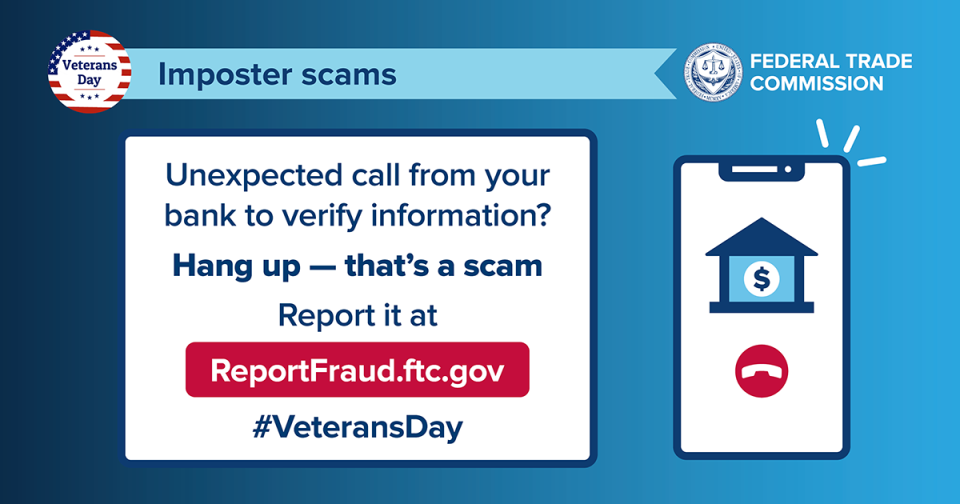As we continue to honor and celebrate veterans, scammers increase efforts around holidays — like Veteran’s Day — to try to take advantage. Right now, a banking scam is tricking veterans (and current servicemembers) into sharing sensitive personal or financial information. Find out how.
Imposters are contacting veterans, servicemembers, and their families. They pretend to be representatives of USAA Bank, Navy Federal Credit Union, and other banks. They’re asking for information — like your Social Security, bank account, or credit or debit card number, or your password. They’re saying that your debit card has been blocked, they’ve detected fraudulent activity, or some other urgent excuse. (These, by the way, are all lies.)
You may get one of these unexpected calls or voicemails from your bank, or even a surprise text or email with a link that includes an official-looking logo (also all fake). These are from scammers who want your information to get into your accounts or steal your identity. And if you click on the fake link, they could install malware on your phone or computer, which could give them complete access to your device and information.
Here’s how to protect yourself:
- Don’t trust caller ID. Scammers fake the number they call from. Never call back phone numbers from your caller ID or those left in voicemails.
- Never give personal information to anyone who contacts you out of the blue. Financial institutions won’t ask you for personal information or passcodes. If you think it could be legit, contact the company using a website or phone number you know is real.
- Don’t click links in unexpected texts or emails. Those are often phishing scams. If you’ve clicked a link by mistake, update your phone’s and computer’s security software.
Suspect a scam? Report it at ReportFraud.ftc.gov and visit MilitaryConsumer.gov for more resources. Also, read more about the FTC’s rulemaking proposal to combat impersonation scams.


some "lawyers" are messaging vets telling them they have monies coming from the camp lejune water problem.
I've been getting loads of spam mail and text for a while now and I take screenshots of them. Thank you
As usual, too much info--I'm not sure I could remember it or find it when needed. Also, using AI, I would like the government to allow all Americans to simply put a suspected e-mail or phone number on the list and CHECK IT OUT--discarding it if ok, and prosecuting the scammers. And. companies should also have responsibility for checking spam using their name. Example: recently I called AOL about what was a clearly bogus e-mail pretending to be AOL, and they actually seemed annoyed that I called and said they would not//could not do anything about it--dumping full responsibility on me as their customer.
In reply to As usual, too much info--I'm… by William Cline
I totally agree, I’ve had an email and text from Amazon (fake) claiming I had a really large charge made and it was going to go to my credit card. I called Amazon and the person said it wasn’t Amazon.and that was pretty much it. My card company wouldn’t have approved it anyway. But someone needs to make these people and other scammers pay big time. I get more and more every day, it really gets old.